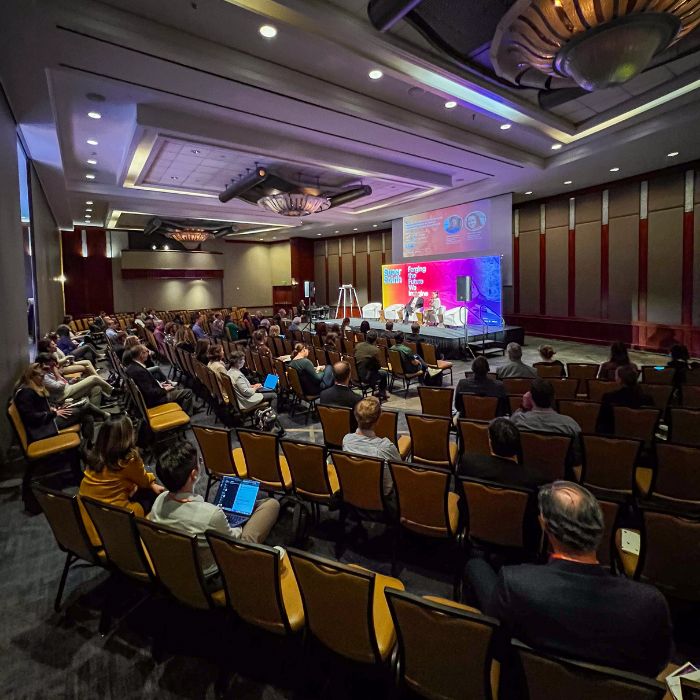The sustainability community from Georgia and beyond came out in full force to share the latest innovations in the space at the first Super South. Georgia Tech was well represented at the summit for climate innovation and impact, with conference organizational support and co-sponsorship provided by the Drawdown Georgia Business Compact, an initiative of the Ray C. Anderson Center for Sustainable Business (Center) at the Scheller College of Business.
The summit took place April 15-17, 2025, at the CNN Omni Hotel at Centennial Park. The keynotes, breakout sessions, innovation expo, capstone project exhibition, and documentary films explored six program themes: clean energy, smart communities, the land, H2O, industry and infrastructure, and smart lifestyle.
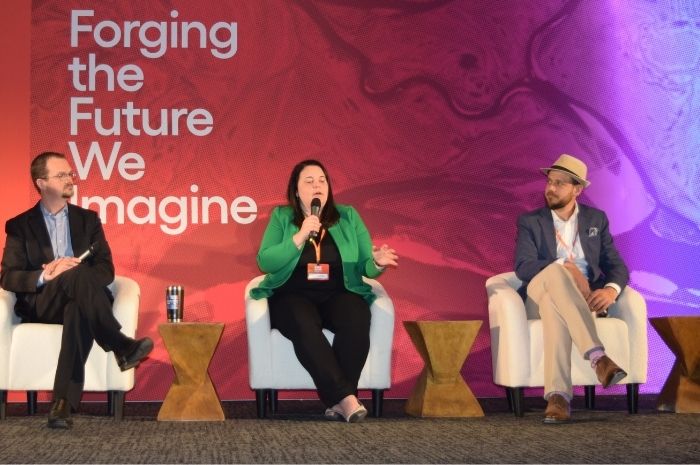
“Thanks, Ray”
The theme of the conference was “forging the future we imagine.” It is hard to imagine anyone who better embodies that commitment than Ray C. Anderson (IE ’56, Honorary PhD ’11). On the first night of the conference, writer and director Nathan Havey hosted a screening of his film, Beyond Zero, which tells the story of Anderson’s evolution from industrialist to self-proclaimed “plunderer of the earth” and sustainable business visionary.
Anderson was founder and chairman of the global flooring manufacturer Interface. Anderson’s sustainability story began in 1994, when Interface lost a major order from California because the prospective client asked Interface what they were doing about the environment – but they didn’t have an answer. Anderson did his research and came to the hard truth about the harm his company was doing to the environment. He had the courage to abandon the comfort of the status quo and to begin his company’s climb up “Mount Sustainability.” His inspirational story serves as an exemplar of how any company can approach sustainability without sacrificing quality and profits.
Following the screening, Havey held a conversation with John A. Lanier, Anderson’s grandson and executive director of the Ray C. Anderson Foundation, and Liz Minné (MSE ’10, MS EnvE ’13, PhD EnvE ’15), head of global sustainability strategy at Interface. Minné said, “I get to keep living this story every day. It’s an honor to continue to do that work at a place that is truly inspirational.” Interface’s next ambitious goal is to reach carbon negativity without offsets by 2040.
Lanier reflected on the work of the Foundation, stating that he hopes his grandfather’s work will live on through the entities it has supported, including the Center. When asked to share words of advice for trying times, he responded, “When things are going well, work hard. When they’re not going well, work harder. Don’t fall into the morass of ‘I can’t even try.’ We all have to try. What I would tell young people is: Stay on fire… That’s what’s needed right now.”
Being a “Good Grid Citizen”
With big energy demands comes big responsibility. This was the heart of a conversation between David Eady, the Center’s director of industry engagement, and Katie Ottenweller, Southeast lead for energy policy and markets at Google. They discussed how industry partnerships can unlock decarbonization in power generation for the Southeast, as well as related benefits for the community.
Eady introduced the Drawdown Georgia Business Compact (Compact), which launched nearly four years ago. The Compact builds on Drawdown Georgia research, which identified 20 high-impact climate solutions for the state. The Compact engages the business community in accelerating the deployment of these solutions. A key area of importance is clean energy.
Google, one of the Compact’s founding members, is actively involved in working with utilities to drive forward investments in carbon free energy. Ottenweller explained how Google is committed to making information more accessible to people. However, as more companies and consumers use Google’s products and services, more energy will be required. She framed a key question: “How can we be a good grid citizen?”
Ottenweller’s role involves making sure Google is using electricity responsibly in the Southeast. By 2030, Google wants all of its power to be carbon free. In order to reach this challenging goal, Google is signaling to the market, developers, and entrepreneurs that it wants to invest in new technologies.
Energy affordability for all is also a priority. Ottenweller said, “If we can build the most efficient data center but the trailer down the road can't afford their energy bill, we have failed. We need to keep energy affordability at the center of everything we do.” Google is currently funding $3M to help low-income households to make necessary health and safety repairs to their homes that will allow them to access free home weatherization programs. Also, just this month, Google announced a new $500,000 gift to support Georgia Power's program to invest in weatherization for low-income households across Georgia.
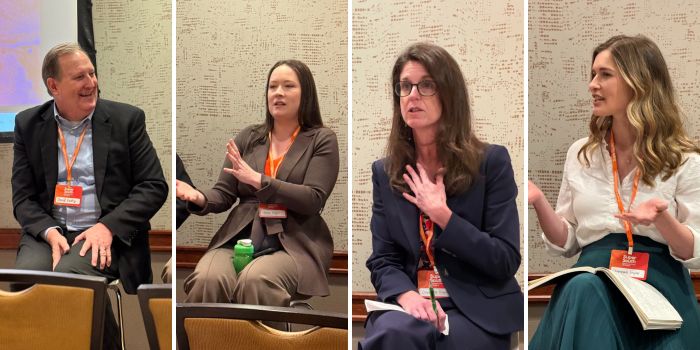
Decarbonizing Across the Value Chain
David Eady also moderated a panel on decarbonization across the value chain with sustainability experts from Compact companies. Panelists included Charlotte Pugh (EY), Anne Rogers (AGCO Corporation), and Savannah Seydel (Better Earth). The conversation focused on strategies and innovations aimed at reducing carbon emissions throughout the entire value chain, from raw material sourcing in the supply chain to use and disposition of their products.
Eady said, “As companies are looking at their carbon footprint, 70 to 80 percent can be upstream or downstream in the overall value chain – not operations. This presents great opportunities for partnership and innovative approaches.”
Rogers shared the perspective from AGCO, a large global manufacturer and distributor of products and machines that help farmers grow food to sustainably feed the world. The company’s machines have “hundreds of thousands” of components. As a result, when it comes to suppliers, AGCO must build relationships with manufacturers across the globe. Rogers said the company sets clear expectations in a supplier code of conduct. Seeing the full picture when it comes to impact is also key. She said, “Farmers are our last end point. But for food companies, farmers are the first step in the process. We are in a circle of impact.”
Seydel provided the perspective from Better Earth, a compostable food services packaging company for food service operators. Transportation, Seydel said, dominates the company’s Scope 3 emissions due to its international supply chain. “We’re a smaller fish, but we see a critical responsibility to fix that,” she said.
With several decades working in the sustainability space, Pugh, who works in climate services for EY, said that understanding the data is essential. EY gets a lot of requests to get granular. “You have to prioritize, look at where you spent the most money, and really engage with them,” Pugh said. “It’s a ‘carrot and stick’ mix. In the contract, you need to say what you expect, but you also want to be an ally and a friend. That’s the winning formula.”
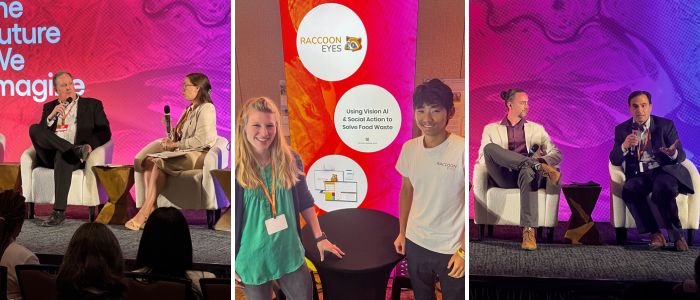
The Center, which launched in 2013, is now seeing the fruits of its educational labor. Current students and alumni of Center programs actively took part in the summit. Kjersti Lukens, the Center’s program manager for over eight years, has organized many student programs, including the Carbon Reduction Challenge, the program for Sustainability Fellows and Ambassadors, and SUSTAIN-X. Lukens reflects, “At Super South, I saw the past and present come together! It was energizing to see students who engaged with our Center now working in corporate sustainability roles making a difference.”
Center alumni at the summit included attendee Emma Brodzik Knapper (MSEEM ’22), who participated in the Carbon Reduction Challenge as an undergraduate and is now the global sustainability engagement manager at Rheem Manufacturing. Tommy Bledsoe (MBA ’20), who was deeply engaged in sustainability courses, Drawdown Georgia research, and Net Impact, served on the panel “Breaking Down the Business Value Equation,” which focused on the long-term value of sustainability in the built environment. Bledsoe shared insights from his role as senior sustainability specialist at CBRE, where he leads client services delivery as part of the property management sustainability program.
Other familiar faces included participants in SUSTAIN-X – a program that supports startups making a positive environmental or social impact. The innovation expo featured students and alumni including Majid Ahmadi, PhD student in public policy and founder of EnergyEase; Mya Love Griesbaum, third-year materials science and engineering major and founder of Mycorrhiza Fashion; and Ivan Zou (CmpE ’23), co-founder of Raccoon Eyes. Their startups offer solutions for energy efficiency, sustainable fashion, and dining hall food waste, respectively.
Griesbaum reflected, “Super South was absolutely electric! Thanks to the incredible support from SUSTAIN-X, I connected with so many visionary changemakers – and even got to share the mission behind Mycorrhiza Fashion with a wider audience. I definitely walked away feeling inspired and recharged!"
“At the Center, we like to say we educate the ‘Ray C. Andersons of tomorrow,’” Lukens said. “It’s amazing to see that mission becoming a reality with our students and alumni making an impact in sustainability today.”
Michael Oxman, the Center’s managing director, said in a conversation with Joey Shea, manager of North American sustainability at Interface, “More and more students come to us who want to engage. Many of our students want sustainability jobs, but it’s difficult to get these jobs. So, we try to teach students to (as Ray said) ‘brighten your own corner’ – but you need the skill set to be able to do that.” Through the Center’s many offerings, students can learn the skills to be sustainability champions in any business role.
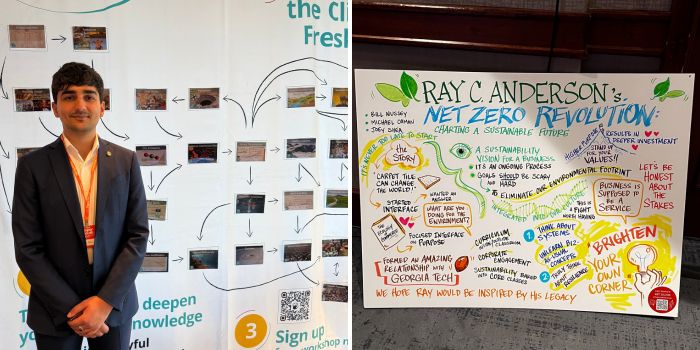
A Thriving Sustainability Ecosystem
Following the summit, Super South co-founder Jon Hutson remarked, “We want to express heartfelt appreciation to the entire Compact team. Your insightful perspective and support brought real substance to Super South – and your work continues to inspire climate action rooted in real-world business innovation and impact.”
Beyond Compact leaders and members, the Super South agenda included many Georgia Tech sustainability experts from across campus, underscoring the Institute’s robust sustainability ecosystem. Marilyn Brown, Regents’ and Brook Byers Professor of Sustainable Systems in the School of Public Policy, shared two trackers that supply the data to help Georgia drive down emissions and replicate success stories. Jennifer Hirsch, senior director at the Center for Sustainable Communities Research and Education, spoke about what it takes to build sustainable communities. Dan Matisoff, professor of climate and energy policy in the School of Public Policy, shared insights on a panel exploring tradeoffs and opportunities related to retrofitting existing structures or investing in new developments. Jennifer Singh, sustainability catalyst at the Advanced Technology Development Center (ATDC), contributed to panels on hydropower innovation and accelerating low-carbon transport systems. The summit showcased collaboration within the Institute, as well as with industry and other partners.
Throughout the summit, the topic of the changing political climate was unavoidable. However, Josh Raglin, chief sustainability officer at Norfolk Southern Corporation, a Compact member, summed up what appeared to be a general consensus: “Sustainability is good for business and the economy. It’s about driving efficiency and doing things that are good for people and the environment. How we talk about sustainability may change – but sustainability is not going away.”
Reporting by Jennifer Holley Lux
Unless otherwise noted, photographs by Ben McDonald and Jennifer Holley Lux
